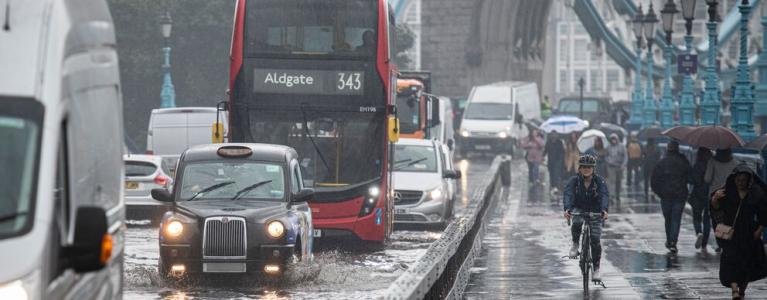
This summer, London was hit by unprecedented flash flooding – tube stations were flooded, roads were closed, hospitals were forced to shut and people had to leave their homes. The floods were devastating for many Londoners and a wakeup call of what we may experience more frequently as our climate changes.
The statistics are stark:
- a quarter of London’s rail stations and 10 per cent of the rail network could face flooding in the future
- 1 in 5 of our schools – and almost half of our hospitals – are either totally or partially at risk of flooding
- and over 200,000 properties in our city are at risk of surface water flooding.
Earlier this month, COP26 in Glasgow highlighted that urgent action is needed now to avoid temperature rises of above 1.5C. But with warnings of more extreme weather leading to increased flooding and new analysis of the latest climate science showing that future extreme rainfall could be more frequent and even more extreme than previously thought, it’s clear we must take precautions now.
What is the Mayor doing?
As more of these extreme events occur, the Mayor has said that London is at a crossroads and must act now to avoid the worst effects of climate change on our city. Whilst the Mayor has no direct responsibilities for managing flood risk he has acted to urgently bring together those who do.
Following the summer flash floods he called together senior leaders from the Environment Agency, Thames Water, the London Resilience Partnership, London Fire Brigade and London’s boroughs - all those who do have responsibility for responding to or managing flood risk - to ensure that everything possible is being done to reduce the impact of these extreme events on our city.
The funding and other issues to prepare for the longer-term challenges of flooding are also being examined together with London Councils and the Environment Agency. The Mayor continues to lobby the Government to devolve more funding and powers to local leaders to enable us to deal with both flooding and the wider impacts of climate change.
What can you do?
For the last four years, the Mayor has run London flood Awareness Week to help Londoners be more prepared for flooding incidents and stay safe if they are affected by it – this coincides with the Environment Agency’s national Flood Action Week.
Whether it’s losing precious photographs, or having to replace furniture or important documents, flood damage can cost people a lot of money and take a long time to recover from. The average cost of flooding to a home is £30,000 and £82,000 to a business, so it pays to be aware and prepared. There are lots of quick and simple things you can do now to help prepare for flooding. Taking just one action can reduce the impacts on your home and family.
Actions to take if you are at a high risk of flooding and / or you receive a severe weather alert or flood warning include
- having important items such as your mobile phone, medicine and insurance documents to hand
- putting your precious and important belongings somewhere safe, like a high shelf or in a waterproof container
- turning off gas, water and electricity
- moving family and pets to safety.
To find out more, visit the How to Plan Ahead for Flooding website.
During a flood you should only travel if you really have to. Flood waters can be very dangerous.
Never drive through flood water. Vehicles can quickly become unstable in moving water. A foot (30cm) of moving water, moving at just 6 miles per hour, is enough to float a car. Two feet (60cm) of rushing water will carry most vehicles away. Always find an alternative route.
To find out more about how to prepare for flooding, check out our webpage. For example, you can check your flood risk and sign up for weather alerts.
You can also do your bit to help reduce the risk of flooding, encourage wildlife and support your wellbeing by changing just a part of your garden from grey to green. You can start small, even if you don’t have a garden of your own. If you already have a front garden keep it green. Paving over front gardens creates more impermeable surfaces which increase the risk of flooding.
Read more about what the Mayor is doing to tackle climate change.